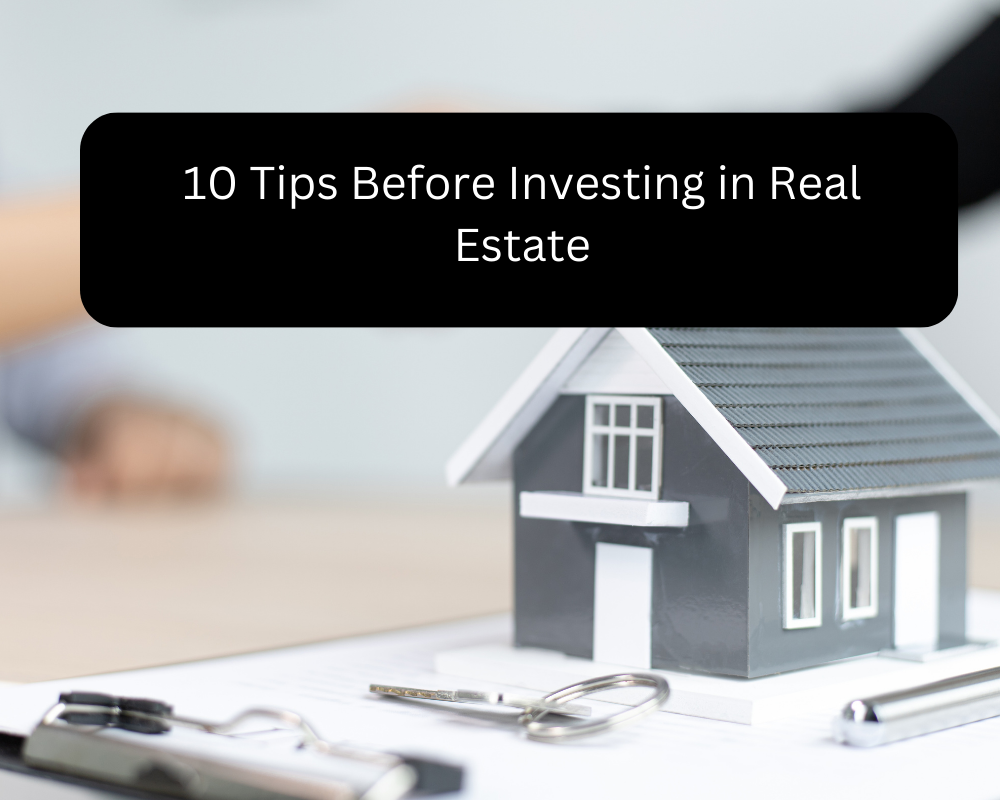10 Tips Before Investing in Real Estate

When you invest in real estate, you have multiple great success stories of millionaires who have chosen to go down this career path, but what you don’t hear is the challenge and risks that come with it. If you want a piece of the pie, it’s important to understand joint ventures, wholesaling, property management and the rest. Those are just a few things you can do to turn a profit in real estate.
It takes a lot of motivation and education to become successful in this highly competitive arena. A degree-level education is not necessary to learn the skills necessary to be profitable in real estate investing. There are certain characteristics and tips you should possess to join the big leagues.
1. Make A Plan
Real estate investors must approach their activities as business professionals and ensure each decision aligns with their short- and long-term goals. Start by sitting down and creating a business plan. If you want to get creative, make a mood board.
This will allow you to visualise the big picture, which can help you maintain focus on the great scheme of things without any confusion. Mood boards are a perfect way to remind yourself, whether daily or not. Having them hung up on your wall will keep you productive and your eyes on the prize.
2. Understand The Market
Effective real estate investors acquire in-depth knowledge of selected markets. This could involve narrowing down on a particular geographical area, such as Birmingham, which has been extremely popular for real estate and is projected for the next decade.
Keep in mind real estate trends and establishing if you want residential or commercial property will make the research part easier. It’s important to take into account the economic climate and consumer trends, whether they are positive or negative.
For example, if mortgage rates are high as well as unemployment, the number of first-time buyers will likely decrease. Acknowledging that information will help you plan for the future and better predict when trends may change, creating opportunities down the line.

3. Timing Your Investments Wisely
While it is important to understand and know the market before entering, your investment success rate will depend on the factors at work in the specific real estate market.
A good rule of thumb is to avoid popular markets, as you will be buying at a high with a much greater risk of plummeting back down and losing your ROI (return on investment). The market moves in cycles due to economic profits.
Looking for a market that is in the expansion phase is key; this is where sales and prices are rising, affordability is at its best and capital investment is rising.
Read: The Pros & Cons of Buying vs. Renting a House
You should refine your search into areas with lower crime rates, great schools, access to good transport links, family-friendly and access to leisure destinations, to name a few. If there is an area that seems to be gentrifying and is improving, it would be wise to look into it in depth and see if there is great potential.
Ticking all these boxes translates to high demand for housing. If the housing supply meets housing demand, real estate investors should seize the opportunity since entry prices for homes remain affordable.

4. Be Honest
Real estate investors are usually not obligated to uphold any particular pledge of ethics; most successful real estate investors maintain a professional and trustworthy reputation. Knowing when to be fair is important. Don’t skip corners and maintain top-tier standards; it will only pay off in the long run.
5. Develop a Niche
This is especially true if you’re entering the world of real estate. While it’s already a very competitive industry, it will help if you understand what you like and focus on it. Having an extensive understanding of a specific area is integral to long-term success.
If you master one particular market, you can move on to additional areas if you wish to expand. Some niches might be high-end residential or eco-friendly homes.

6. Know The Risks
Real estate investors usually hear about the great success stories of individuals who may have made millions from investing in hotels, owning half of the city, etc. You don’t hear any stories where an individual may have failed.
Prudent real estate investors understand the risks—not only in terms of deals but all the legal implications involved—and adjust their businesses to reduce those risks. This could involve working around economic uncertainties and market volatility.
7. Encourage Referrals
Referrals are extremely important for a real estate investor’s business. Maintaining a professional and respectful relationship and attitude towards clients, renters, etc.
Successful real estate investors pay close attention to detail, listen to their clients and professionally handle any issues. If you maintain this potential and establish business relationships, you will be an attractive candidate for future opportunities.
8. Build a Network
This brings me to my next point: building professional relationships assists in the building of a network. It is important for established and new real estate investors as it creates opportunities in the future.
Creating a supportive group of mentors, business partners, and members of a non-profit organisation will allow for growth and opportunities to help each other through times of need.
9.Don’t Stop Researching
When you’ve established and mastered your niche, that doesn’t mean you stop educating yourself on it or ignoring other ‘unrelated’ things. Education can be seen as power and should be approached that way. There is always something new to learn, and it can only help you achieve your long-term goals.
With continuously changing laws and regulations, it’s important to keep updated on any changes that may affect your business. Investors who fall behind risk losing momentum and legal ramifications if laws are not followed.

10. Online Presence
In today’s digital age, having an online presence is crucial. A website serves as a virtual storefront for your real estate business, making it accessible to a wider audience. It gives potential clients and partners a chance to learn about your business 24/7.
Investing in an established website design agency in Manchester or Leeds, whatever works for you, will not only help you build credibility but also help you establish your unique brand and differentiate you from your competitors.



